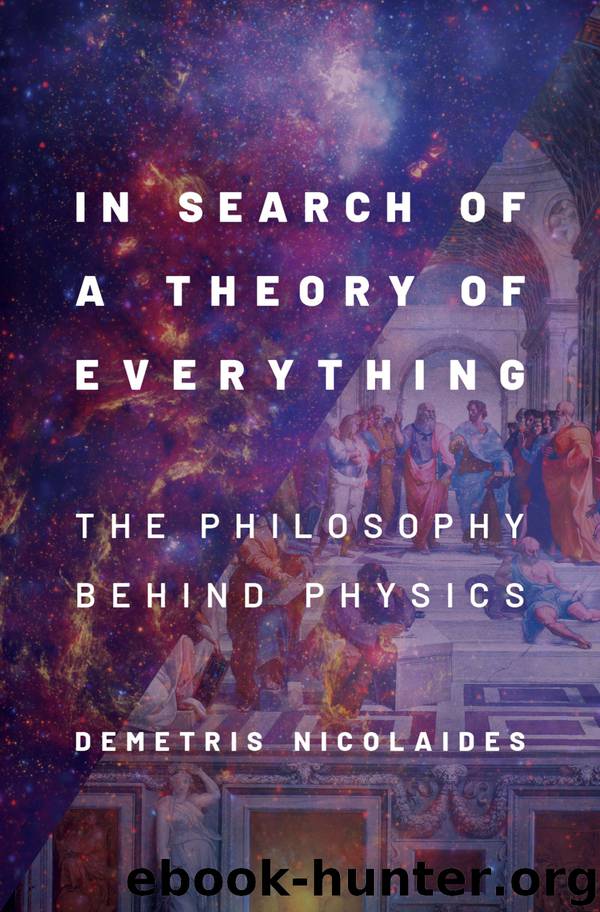In Search of a Theory of Everything by Demetris Nicolaides

Author:Demetris Nicolaides
Language: eng
Format: epub
Publisher: Oxford University Press
Published: 2020-06-15T00:00:00+00:00
Conclusion
After Parmenides, any new natural philosophy would be considered incomplete unless it could address successfully his various conclusions, which, though unconventional, were logical. And as if that by itself was not a formidable task, Parmenides’s best student, Zeno, assertively supports his teacher’s views by adding to the complexity with his famous paradoxes that question the very nature of plurality, space, time, and the reality of apparent motion.
* * *
1Clement, Miscellanies 6.23, trans. Erwin Schrödinger, Nature and the Greeks and Science and Humanism (Cambridge: Cambridge University Press, 1996), 27.
2Although the bread is three-dimensional (with two space and one time dimensions), the real universe is four-dimensional (with three space and one time).
3Albert Einstein quoted in Brian Greene, The Fabric of the Cosmos: Space, Time, and the Texture of Reality (New York: Vintage, 2005), 139. Also quoted in Carlo Rovelli, Seven Brief Lessons on Physics (New York: RiverHead Books, 2016), 60 (Kindle ed.).
4With the appropriate speed and distance—numbers calculated by the equations of relativity.
5That is, my baby-self is a simultaneous event relatively to her, not to me. The expression, “you live in the past,” suddenly makes more sense.
6If change is truly an illusion, how is it created giving us a personal view of the universe in which we remember/know only the past (and only part of it) but not the future (an experience that has been called psychological time)? It’s an open question. To the contrary, the moon’s apparent small size, also an illusion, can be explained: it’s due to its distance.
7Karl R. Popper, Unended Quest: An Intellectual Autobiography (London: Routledge Classics, 2002), 148; or see: https://books.google.com/books?id=NyCEnehPMd8C&pg=PA148&lpg=PA148&dq= popper+einstein+parmenides&q=&hl=en#v=onepage&q=popper%20einstein%20parmenides&f=false (accessed January 9, 2017).
8In my opinion, Being’s completeness property may also be interpreted as the “painting” analogy of the block universe (see end of section “Being and the Block Universe”), where each space-time point is “complete” and unchangeable but it is also different than all other space-time points, creating an unchangeable but diversified universe.
9Aristotle, Metaphysics 985b4–20, trans. Daniel W. Graham, The Texts of Early Greek Philosophy: The Complete Fragments and Selected Testimonies of the Major Presocratics (Cambridge: Cambridge University Press, 2010), 525 (text 10).
10Ibid.
11It’s worth emphasizing once more that this answer is expected, for as mentioned, the uncertainty principles, which helped us to arrive to this answer, are in the first place conceived to describe something, not nothing; the notion of nothingness is indescribable.
12Einstein quoted in Joanne Baker, 50 Physics Ideas You Really Need to Know (London: Quercus, 2007), 165.
13Werner Heisenberg, Physics and Philosophy: The Revolution in Modern Science (New York: Harper Torchbooks, 1962).
14Abraham Pais, Subtle Is the Lord: The Science and the Life of Albert Einstein (New York: Oxford University Press, 2005), 5.
15J. J. Sakurai, Modern Quantum Mechanics (Menlo Park, CA: The Benjamin/Cummings Publishing Company, 1985), 226–229.
16Graham, Texts of Early Greek Philosophy, 211–219.
17Ibid., 219–33.
18Within the context of the scientific method.
19Stephen Hawking, A Brief History of Time: From the Big Bang to Black Holes (New York: Bantam Books, 1988), chap. 8.
Download
This site does not store any files on its server. We only index and link to content provided by other sites. Please contact the content providers to delete copyright contents if any and email us, we'll remove relevant links or contents immediately.
| Aeronautics & Astronautics | Astronomy |
| Astrophysics & Space Science | Comets, Meteors & Asteroids |
| Cosmology | Mars |
| Solar System | Star-Gazing |
| Telescopes | UFOs |
Tools of Titans by Timothy Ferriss(8365)
Turbulence by E. J. Noyes(8040)
Secrets of Antigravity Propulsion: Tesla, UFOs, and Classified Aerospace Technology by Ph.D. Paul A. Laviolette(5366)
Astrophysics for People in a Hurry by Neil DeGrasse Tyson(5182)
Room 212 by Kate Stewart(5105)
Design of Trajectory Optimization Approach for Space Maneuver Vehicle Skip Entry Problems by Runqi Chai & Al Savvaris & Antonios Tsourdos & Senchun Chai(5065)
Pale Blue Dot by Carl Sagan(4996)
The David Icke Guide to the Global Conspiracy (and how to end it) by David Icke(4706)
A Journey Through Divination and Astronomy by Publishing Pottermore(4379)
Goodbye Paradise(3799)
Apollo 8 by Jeffrey Kluger(3702)
COSMOS by Carl Sagan(3617)
The Five People You Meet in Heaven by Mitch Albom(3561)
Losing the Nobel Prize by Brian Keating(3534)
How to Read Water: Clues and Patterns from Puddles to the Sea (Natural Navigation) by Tristan Gooley(3460)
Brief Answers to the Big Questions by Stephen Hawking(3429)
How to Read Nature by Tristan Gooley(3335)
The Order of Time by Carlo Rovelli(3188)
A Brief History of Time by Stephen Hawking(3022)
